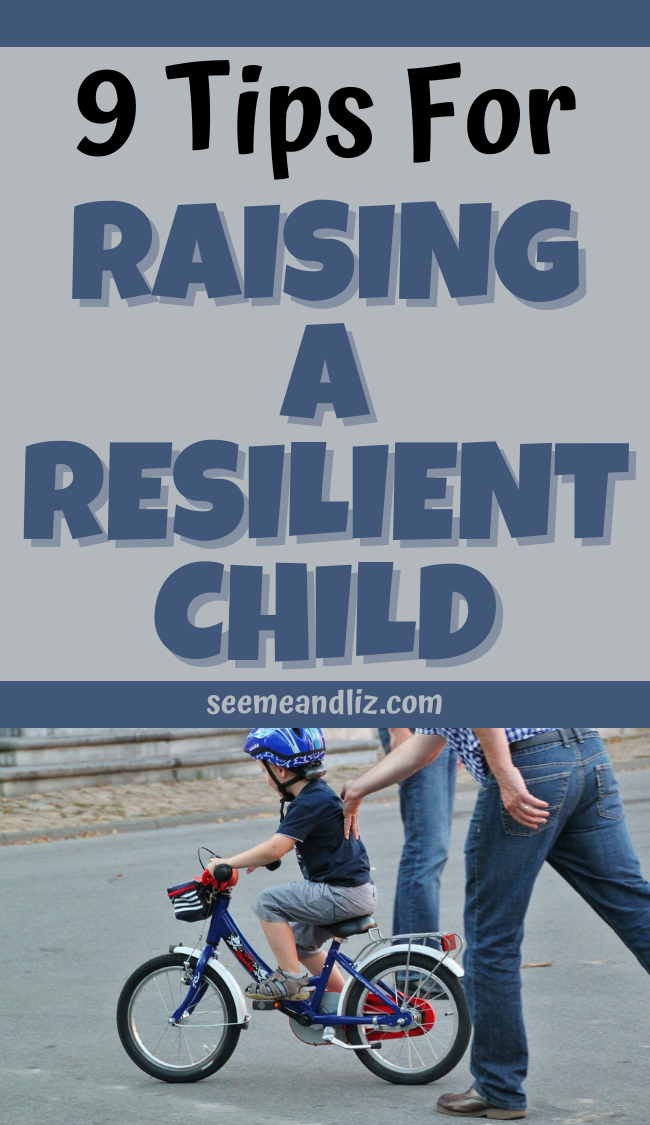
Children are experiencing some of the highest levels of stress pediatric health officials have ever seen.
School curriculum in the early years is moving away from play, focusing more on academics.
More academics replaced recess and movement.
Children tread water in the bog of expectations without armor to protect them from the rising stress levels.
While changing the system may be a slow process, parents can provide children with an opportunity for increased resiliency.
What is resiliency?
Resiliency is trusting one’s self with confidence.
It is the belief in being strong in the face of difficult situations, finding the best course of action, and navigating the trouble.
Resilient kids are problem solvers. They develop creative solutions in difficult situations.
They know they will eventually get from point A to point B.

9 Parenting Tips That Can Help You Raise Resilient Kids
1. Stop Overprotecting Them
According to psychotherapist Lynn Lyons, “whenever we try to provide certainty and comfort, we are getting in the way of children being able to develop their own problem-solving and mastery.”
Being overprotective of your child will feed their insecurities.
Instead, allow children to experience the world with independence.
Caregivers can provide a circle of security, allowing children to go out and interact with their environment when needing support or wanting to talk about the experiences they return to a parent who is available to support them.
This ebb and flow put the child in charge of connections with parents rather than fostering parents hovering.
2. Avoid Controlling Them
Coaches help kids develop skills and encourage them, but allow them to play the game.
Your job as a parent is like a life coach.
Support your child so that they can flourish and develop.
Allow them to make mistakes.
Doing things for children robs them of the experience to gain competence.
Doing some activities with them teaches and builds confidence alongside cooperative skill-building.
3. Listen To Your Children
Listen to your children, so they know you understand their feelings and perspectives.
They will learn that they can turn to you when they are troubled and see you as a comfort source.
Empathy helps children develop compassion and healthy relationships with other people.
Keep journals for kids to refer back to difficult moments and help them recall how they navigated difficulties in the past.
These become proof of listening to their struggles, validating them.
4. Make Time For Them
One-on-one time doesn’t have to be time carved out of an already hectic schedule.
What you can do is make your daily tasks like bath time and meal time count.
Encourage your kids to talk and express how they are feeling.
Doing so lets your children know that they have a safe space where they can open up.
5. Let Children Make Mistakes
When your child does a hurried, poor job on a school project, you may feel a strong urge to help them improve or fix it.
Make sure to allow them to lead the review of the project.
Help your child by pointing out mistakes or items they could do differently, but then take a step back.
Journals for kids can provide a tracking system for turning mistakes into learning opportunities.
It’s essential to embrace a child where they are.
Children with disabilities and learning difficulties may require more support or reminders.
Do not do the work for them; instead, teach them tricks and memory supports that become the foundation for productivity in the future.
Teach your child to keep going rather than give up.
This is also true for young children.
If your child is trying to put the circle into the square opening of the shape sorter give them time to figure it out.
You can show your child the side where the correct shape is but then let them try again.

6. Teach Children To Manage Their Emotions
Emotional management is the key to resilience.
Children who self regulate are better able to work through disappointment.
Let your kids know that all emotions are okay.
But what’s important is that they think through what they should do next.
Children should feel free to express emotions appropriately (that includes allowing boys to cry).
While all feelings are valid, behaviors resulting from emotions can become problematic.
Children who learn the importance of what they do with their senses and the energy behind them learn self-control.
This is another opportunity to use journals for kids to help them track patterns in emotions.
7. Push Children Out Of Their Comfort Zone
Communicating can be difficult, especially coming from a child’s frame of mind.
A child may only want to only sleep in a specific place.
Maybe your child needs a task completed in a certain way.
We must push children out of their comfort zones while maintaining their feelings of safety.
Parents who create and foster secure environments help children try new things.
Help children have the confidence to try new things.
Let them know it may be difficult, but with small steps, it can be done.
Highlight their strengths and make sure to point out progress regularly.
8. Let Children Own Up To Their Mistakes
Parents should actively apologize to their children when they make mistakes.
Snapping at your child or being late for pick up are opportunities for parents to express solace for errors.
According to the social worker, Amy Morin, it would help to explain what your child did wrong.
And then point out the lessons they can learn from it and how they can fix the situation.
She says teaching children it is okay to make mistakes is so important.
You must also teach children the importance of apologizing.
9. Be A Role Model
Children learn best through observation.
Caregivers are essential, and critical role models for children.
They learn skills by gathering information about the world around them.
They learn acceptable behaviors from how they see adults relate to that sometimes confusing world.
Resiliency isn’t solely about surviving.
Resiliency is about having the ability to problem-solve, have success or failure, and continue to try.
Parents have a toolbox of tricks to help children become and maintain their resiliency.
Author Bio: Alexandra Eidens is the founder of Big Life Journal, a series of engaging journals for kids to help them develop a resilient growth mindset so they can face life’s challenges with confidence.





